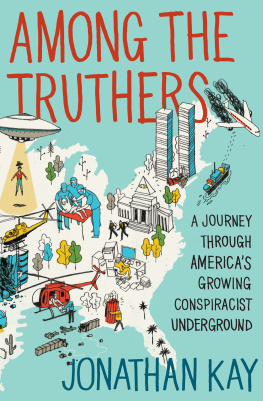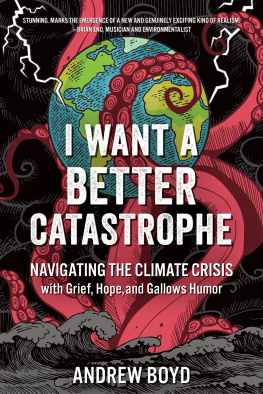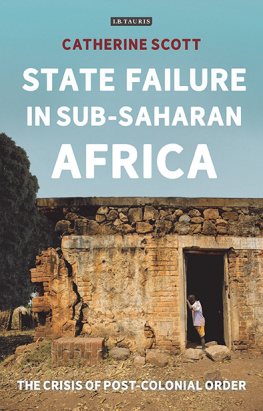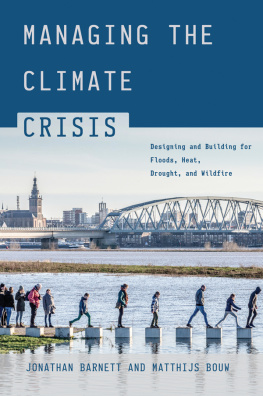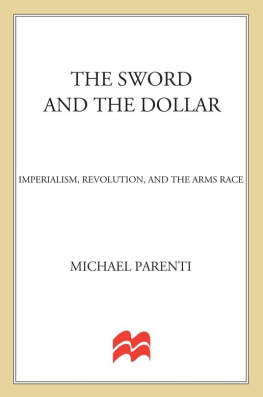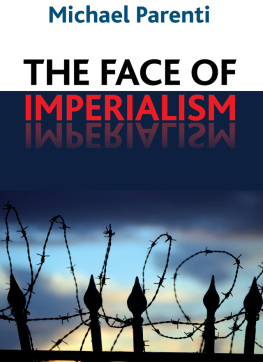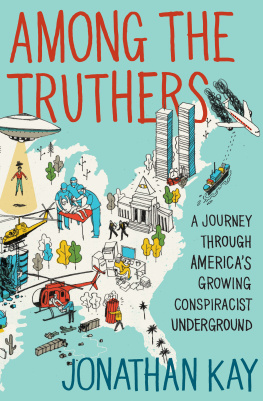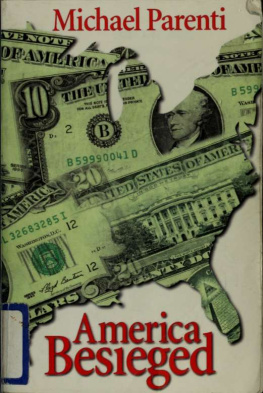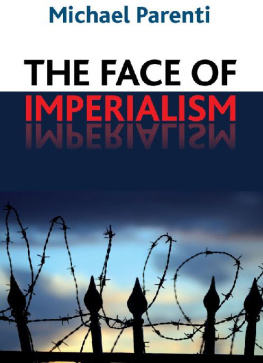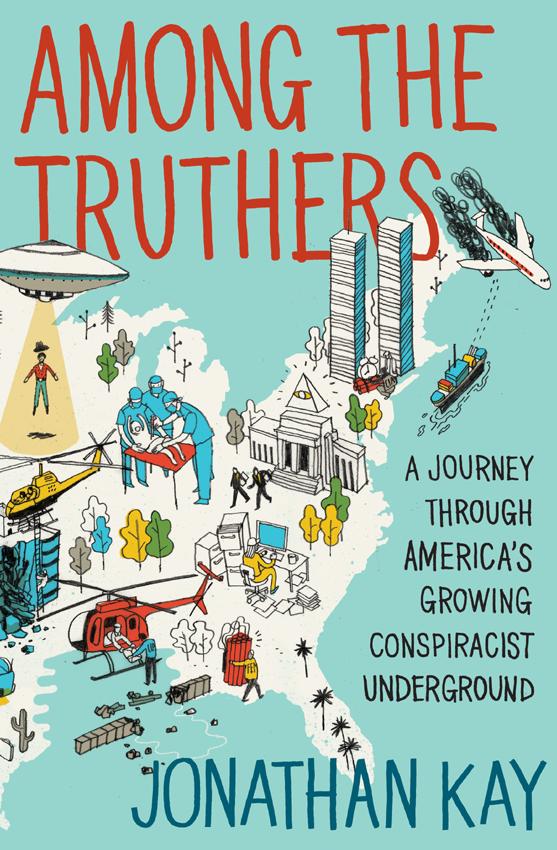
AMONG THE TRUTHERS

A JOURNEY THROUGH
AMERICAS GROWING
CONSPIRACIST UNDERGROUND
Jonathan Kay

Contents
A t 9:40 on the morning of November 1, 1755, Portugal was rocked by the most deadly earthquake in the recorded history of Europe. In Lisbon alone, more than thirty thousand people perished. Many victims were entombed in their churches, which collapsed around them as they celebrated All Saints.
The scene that emerged when the earth stopped shaking was one of Last Days. A tsunami swallowed the citys harbor, killing many of the survivors whod assembled on the shore. A fire at the Royal Hospital roasted hundreds of patients alive. Gallows sprouted up on the citys hilltops, from which were hanged the desperate looters trying to survive amidst the ruins.
In purely quantitative terms, death on this scale was not uncommon in eighteenth-century Europe, which often was ravaged by wars and plagues. But the sudden, spectacular nature of the Great Lisbon Earthquake filled Europeans with a special kind of terror. Indeed, the impact of this horrific event on European thought and culture has sometimes been compared to that of the Holocaust. Most significant, perhaps, was the space that opened up for radical challenges to the authority of the Church, as Enlightenment philosophers asked how the benevolent God of the Christian Bible could permit such a catastrophe.
One of those men was Franois-Marie Arouet, better known by his pen name, Voltaire. In his 1756 Poem on the Lisbon Disaster, he pronounced his despairOh unhappy mortals! Oh wretched earth! Oh dreadful gathering of so many dead!but also his anger, aimed at contemporaries who depicted the event as just another mysterious subplot in Gods master plan:
Come, ye philosophers, who cry, Alls well,
And contemplate this ruin of a world.
Behold these shreds and cinders of your race,
This child and mother heaped in common wreck,
These scattered limbs beneath the marble shafts
A hundred thousand whom the earth devours,
Who, torn and bloody, palpitating yet,
Entombed beneath their hospitable roofs,
In racking torment end their stricken lives.
To those expiring murmurs of distress,
To that appalling spectacle of woe,
Will ye reply: You do but illustrate
The Iron laws that chain the will of God?
Say ye, oer that yet quivering mass of flesh:
God is avenged: the wage of sin is death?
What crime, what sin, had those young hearts conceived
That lie, bleeding and torn, on mothers breast?
Did fallen Lisbon deeper drink of vice
Than London, Paris, or sunlit Madrid?
Three years later, in Candide , Voltaire satirized this superstitious attitude through the character of Pangloss, a philosopher who greets every unspeakable tragedyincluding the Great Lisbon Earthquake itselfwith fatuous syllogisms aimed at proving ours to be the best of all possible worlds. Throughout their shared adventures, Candide holds Pangloss in awe. Only in the books final pages, as the two men find themselves tending a subsistence farm in an obscure corner of the Ottoman Empire, does a skeptical Candide glimpse the truth that life can be cruel and random, and that the best course is simply to muddle through, using our wits as well as practically possible.
Or as Candide put it in the books last line, in response to one of Pangloss particularly ambitious flourishes: Excellently observed. But let us cultivate our garden.
I n the two and a half centuries since Voltaire helped usher in the Enlightenment, Western societies gradually, fitfully have come to embrace rationalism and skepticism. We have separated church and state, enshrined science, questioned God, elevated materialism over piety, swept aside the divine right of kings, and otherwise followed the skeptics claim that our world is shaped by human agency, in all its cruel imperfection, not some grand blueprint imposed from on high. America itself, founded by rational deists, has long been considered the crown jewel of the Enlightenment.
Yet there are risks inherent in the rationalist project, as the philosophers themselves sometimes acknowledged. A little learning is a dangerous thing, wrote Alexander Popea reminder to those who embraced the ideal of universal enlightenment that human reason remains an imperfect tool and that skepticism can be a two-edged sword. Even now, the intellectual edifice weve built on these foundations occasionally teeters, shaken by the tectonic social forces set in motion by depression, war, and terrorism. Let us cultivate our garden may be persuasive advice in normal times. But when skyscrapers crumble, when great powers are laid low, we demand a grander narrative than mere chaos, and grander villains than mere criminals and lunatics. In France after the French Revolution, on Americas Great Plains following the depressions of the late nineteenth century, in Germany after World War I, and across the Western world in the shadow of Cold War hysteria, JFKs death, the Vietnam War, Watergate, and the rise of the 1960s counterculturethese have been the moments when shrieking prophets and conspiracy theorists found their followers. Americans now are living through another such moment, one that began with the collapse of the Twin Towers, and has continued through the aftershocks emanating from Afghanistan, Iraq, the 2008 financial crisis, and the crippling recession that followed it.
On the op-ed pages of the New York Times and on the airwaves of NPR, Americas respectable intellectuals reassure one another that we are merely passing through a transient phasea rekindling of populist agitation that comes and goes with the political tides. Its just a matter of waiting it out. But the evidence suggests that Americas state of intellectual agitation in the aftermath of 9/11 isnt a temporary phenomenon. Like the Lisbon Earthquake, it has had far-reaching social, political, and psychological consequences that have yet to be fully absorbed or understood.
The reason for this goes in part to the nature of terrorism itself, whichafter eliciting a brief spasm of patriotism and national solidarityinevitably shrinks a societys common political center. Since 9/11, America has been implicitly divided between those who believe the country had provoked its enemies, and those who dont; between those who believe America needs to retreat from the world stage, and those who want to project freedom and democracy more aggressively than ever; and, in the purely domestic arena, between those who embrace the romantic project of returning America to its original pure libertarian social contract, and those who see its future in the image of the modern, multilaterally encumbered European welfare state. Like an earthquake, 9/11 produced a great fissure through the heart of Americas political centerwith two increasingly polarized ideological camps sniping at one another on radio, cable TV, and blogs from either side of the divide.
It is not just politics that separate these two camps, but the very manner by which they answer fundamental questions about the world. Is the earth getting hotter, or is global warming a hoax engineered to bring America into a UN-controlled One World Government? Is America led by a brilliant visionaryor a fifth columnist intent on bringing America down in the name of some sinister Afrocentric, Islamist, or communist agenda? Is socialized medicine necessary to make America a humane society, or is it a Malthusian plot to put Granny before a death panel? Which is to say: The basic building blocks of our political reality.
Next page
